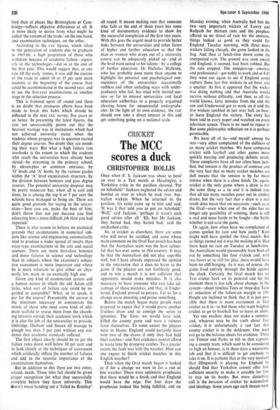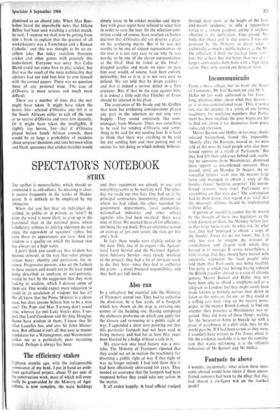The MCC scores a duck
CRICKET CHRISTOPHER HOLLIS
Once when F. S. Jackson was about to bowl an over in a Test match at Headingley, a Yorkshire critic in the pavilion shouted, 'Put on Schofield!' Jackson neglected the advice and bowled an over in which he took four Aus- tralian wickets. When be returned to the pavilion, his critic came up to him and said, 'It was I that told you to put on Schofield.' 'Well,' said Jackson, 'perhaps it wasn't such good advice after all."Eh, but Mr Jackson, they batted bad, they batted bad,' said the unabashed critic.
So, at cricket as elsewhere, there are some who will never be satisfied, and some whose main comment on the Oval Test match has been that the Australian team was the least colour- ful that has ever come to this country. It may be that the Australians did not play superbly well, but I have already expressed the opinion in the SPECTATOR that it does no harm to the game if the players are not faultlessly good, and to win a match it is not sufficient that opponents should make mistakes. It is also necessary to have someone who can take ad- vantage of those mistakes, and that, in Under- wood, England proved to possess. Let us for a change cease moaning and praise something.
Before the match began many people were prepared to expect that it would prove another fruitless draw and to consign the series to ignominy. The Tests, we would have said, killed the county game and were a ruinous farce themselves. To some extent the players were to blame. England could certainly have won two of the draws if only they -had held their catches—and Test cricketers cannot afford to waste time by dropping catches. To a greater extent the fault was with the weather., How can one expect to finish cricket matches in this English weather?
Then when the Oval match began it looked as if for a change we were in for a run of fine weather. There were optimistic prophecies that there would be a finish and that England would have the edge. For four days the prophecies looked like being fulfilled, and on
Monday evening, when Australia had lost the two very important wickets of Lawry and Redpath for thirteen runs and the prophets offered us no threat of rain for the morrow, things looked as good as they could for England. Tuesday morning, with three more wickets falling cheaply, the game looked in the bag. And then at lunch-time down came the unexpected rain. The ground was soon awash and England, it seemed, had been robbed. But the rain stopped. The moppers-up—amateur and professional—got nobly to work and at 4.45 they were out again to see if England could capture those last five wickets in an hour and a quarter. At first it appeared that the wicket was doing nothing and that Australia would survive without difficulty, and then, as all the world knows, forty minutes from the end the sun and Underwood got to work on it and the five wickets tumbled in just over half an hour, to leave England the victory. The story has been told in every paper and watched on every television screen. There is no need to repeat it. But some philosophic reflection on it is perhaps permissible.
We have all of us—and myself among the rest—very often complained of the dullness of so many cricket matches. We have compared cricket with football and other games more quickly moving and producing definite result. These complaints have all too often been justi- fied, but tension is the product of contrast and the very fact that so many cricket matches are dull means that the tension is by far more intense when there is a close finish. Or, again, cricket is the only game where a draw is not the same thing as a tie and it is indeed true that all too many matches peter out in aimless draws, but the very fact that a draw is a real result does mean that on occasions—such as at the Oval—even when one of the sides has no longer any possibility of winning, there is still a real and tense battle to be fought—the battle whether it can save the game.
Or again, how often have we complained of games spoiled by rain and how justly? Rain might well have spoiled the Oval match. But as things turned out it was the making of it. Had there been no rain on Tuesday at lunch-time, the Australians would presumably have been all out by something like four o'clock and, with two hours or so still for play, there would have been no cliff-hanging. As it was, of course, the game lived entirely through the battle against the clock. Certainly the Oval match has set Test cricket back on its pedestal and for the moment there is less talk about change, in the system—about timeless Tests or three-day Tests or reduction of the follow-on margin to 150. People are inclined to think that it is just pos- sible that there is more excitement in Test cricket as it is—to bid those who want brighter cricket to go to baseball but to leave us alone.
Yet one swallow does not make a summer, and, whatever may be the truth about Test cricket, it is unfortunately a sad fact that county cricket is in the doldrums. One need not go to the balance sheets for evidence There are Titmus and Parks to tell -us • that captain- ing a county team, which used to be considered so high an honour, is in these days a wearisome job and that it is difficult to get anybody to take it on. It is pathetic that at the very moment -that Illingworth is playing for England he should find that Yorkshire cannot offer him sufficient security to make it possible for him to stay on its books. But more disturbing still is the invasion of cricket by nationalism and ideology. Some years ago such threats were
dismissed as an absurd joke. When Max Beer- bohm heard the improbable news that Hilaire Belloc had been seen watching a cricket match, he said. 'I suppose we shall now be getting from him a book to explain that the greatest of all wicketkeepers was a Frenchman and a Roman Catholic,' and this was thought to be an ex- cellent joke. But today racialism threatens cricket and other games with precisely this bedevilment. Everyone was sorry that Colin Bland could not come here to play cricket, but that was the result of the mere technicality that advisers had not told him how to arm himself with the correct papers. There was no question there of any personal issue. The case of d'Oliveira is more serious and much more difficult.
There are a number of lines that the MCC might- have taken. It might have taken the heroic line—selected d'Oliveira and left it to the South Africans either to tall off the tour or to receive d'Oliveira and treat him decently. Or it might have taken the intelligible, if slightly less heroic, line—that if d'Oliveira played before South African crowds, there would be so large a probability of incidents about umpires' decisions and riots between white and black spectators that cricket matches would
simply -cease to be cricket matches and there- fore with great regret have refused to select him in order to save the tour. Or the selection com- mittee could, of course, have reached an honest decision that d'Oliveira did not deserve a place on his cricketing merits. But if he was not worthy to be one of sixteen representatives on the tour it is not very easy to see why he was worthy to be one of the eleven representatives at the Oval. Had he failed at the Oval— dropped catches and made no runs—to pass him over would, of course, have been entirely defensible; but as it is, it is not very easy to defend. We are told that he drops catches— and that is. indeed a serious defect in a Test cricketer. But, if that be the case against him. it is indeed a little odd that Fletcher of Essex should be selected in his place.
The assurances of Mr Insole and Mr Griffith that none but cricketing considerations played any part in the selection do not ring very happily. They sound ominously like com- muniqués from Moscow. There was something to be said for sending d'Oliveira and some- thing to be said for not sending him. It is hard to think that there was anything to be said for not sending him and then putting out an excuse for not doing so which nobody believes.







































 Previous page
Previous page